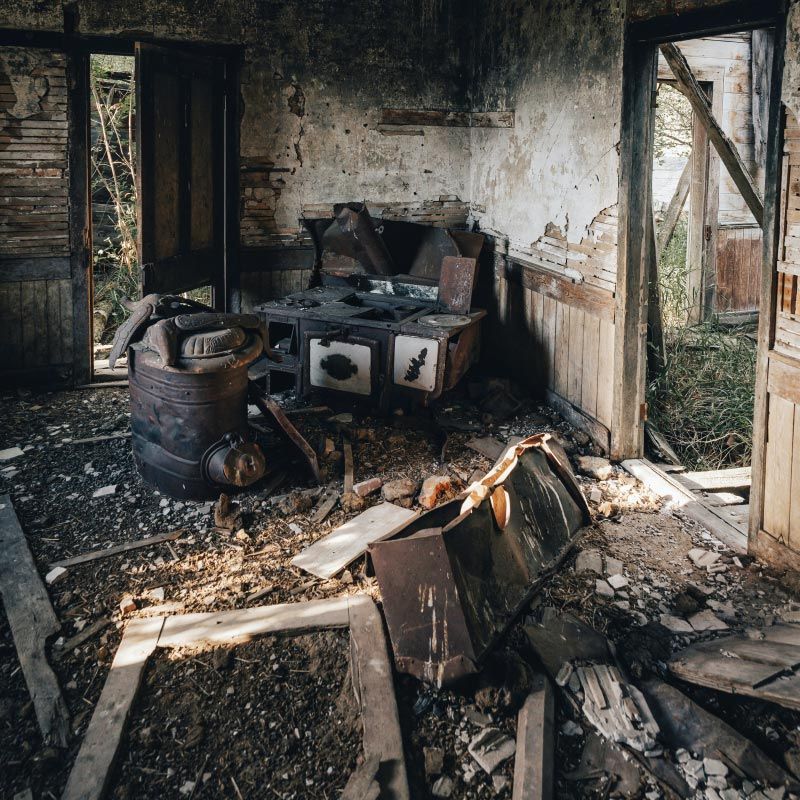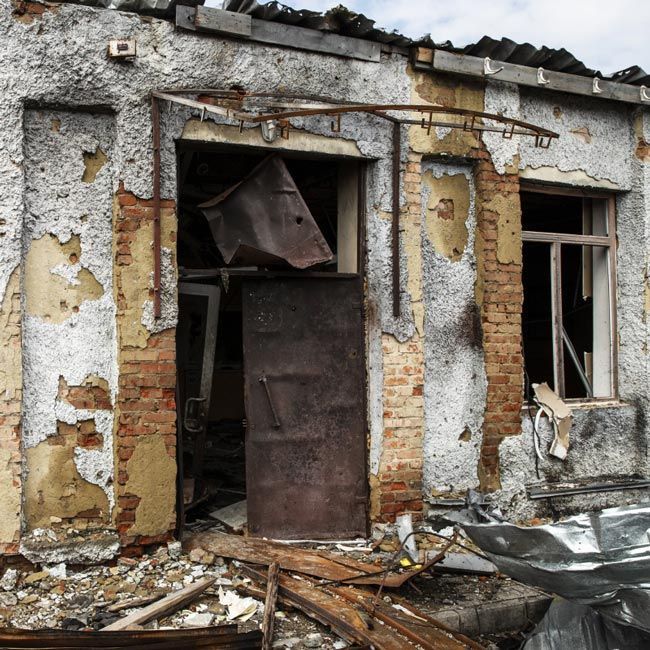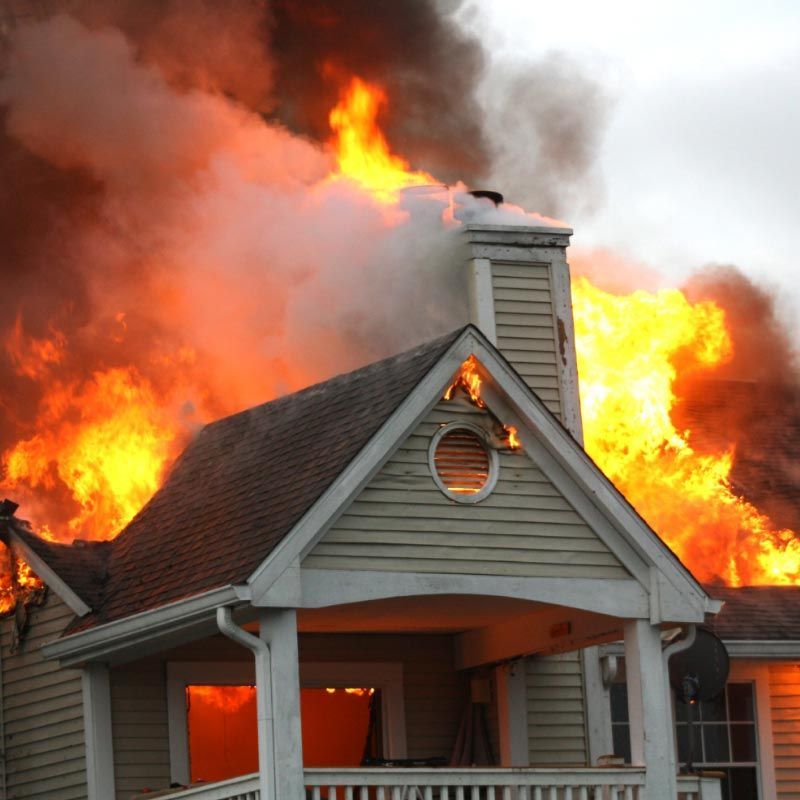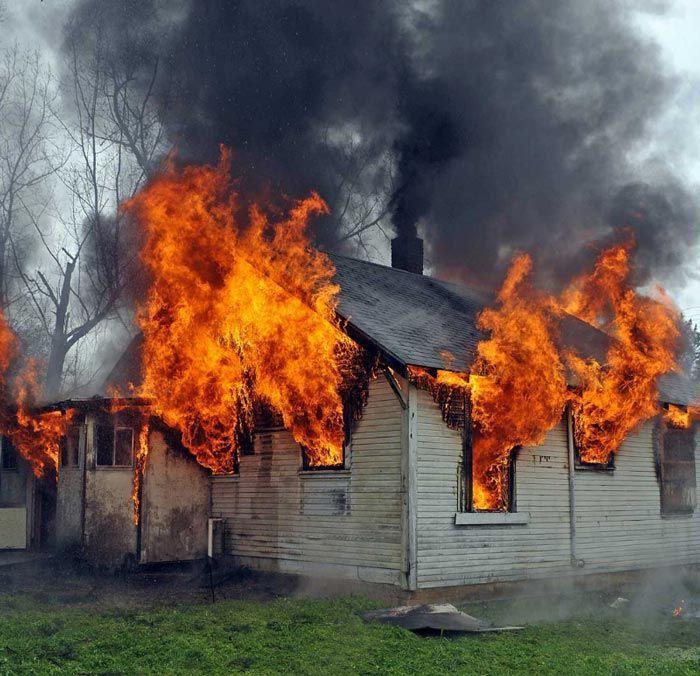How to Sell a Fire-Damaged House Fully Explained
Free Offer Form
To sell a fire-damaged house, homeowners should take immediate steps by contacting their insurance provider, scheduling a property inspection, and documenting all the damage.
It's important to assess the extent of the damage first before deciding whether to
repair the house, sell it as-is, or consider other options.
Legal aspects and effective marketing strategies for selling a fire-damaged house should also be considered.
Selling a house with fire damage can be challenging because potential house buyers might view it as less valuable, and restoration can be costly — typically starting at $1,000 for minor fixes to over $70,000 for major renovations.
However, with a clear understanding of the necessary steps and looking at all available options, selling a fire-damaged house successfully is possible. Continue reading to learn how.
IMMEDIATE STEPS AFTER A FIRE INCIDENT
After house fires, make sure everyone is safe. Then, call 911 or the fire department. Once the fire is out, check the damage and secure your home to prevent more problems.
You'll likely have to move into temporary housing as you spend time processing the incident and assessing the damage.
When selling a fire-damaged property, immediately do the following:
- Contact your insurance company first to file a claim.
- Organize a property inspection to assess the damage and determine what needs to be repaired.
- Keep detailed records of all the processes you've taken in the house fire aftermath to ensure a smooth sale of the property.
Reaching Out to Your Insurance Provider
Right after a fire damages your house, the first thing to do is call your insurance company.
This will let you figure out the following:
- How much money you'll be reimbursed
- Your insurance policy coverage
- The steps forward for repair or restoration
The insurance company often pays you the actual cash value (ACV) for your things. This means they give you what your items are worth today, considering their age and use.
This ensures you have the financial means to repair and restore the property, which is important if you decide to sell it later.
Once your claims are processed, the insurance company will send an adjuster for a property inspection.
IMPORTANT: It's crucial to avoid hastily entering into long-term contracts with a real estate agent before understanding the full extent of the property's damage and the insurance settlement.
Organizing a Property Inspection
Once the fire marshal allows re-entry, a fire-damaged home should be inspected before the homeowner decides whether to repair or sell it.
Typically, an insurance adjuster first inspects the home to assess damages and decide on compensation.
A reputable cash home buyer may handle the inspection if you're selling the house as-is.
Otherwise, you must organize the property inspection by hiring public insurance adjusters, restoration companies, or structural engineers.
Hiring a professional inspector is advisable to get a second opinion. They may spot structural, HVAC, electrical, and other hidden damages not seen by the adjuster.
Negotiating for fair compensation might be necessary if significant discrepancies are found compared to the initial insurance assessment.
Recording the Fire Damage
Take clear photos and videos of all damage, inside and out, no matter how small. This is vital for insurance claims, tax deductions, and showing prospective buyers the extent of the damage.
Also, create a written inventory of all damaged items, noting their estimated value or repair cost.
Remember to document the condition of each room, the house's structural integrity, and any damage to personal items.
Keep detailed records of all communications with your insurance, contractors, and restoration companies to ensure a smooth selling process later on.
All of the above can aid in the selling process and insurance negotiations.
GAUGING THE SEVERITY OF FIRE DAMAGE
Assessing the severity of a fire-damaged home involves the following:
- Evaluating the structural impact.
- Determining the fire's nature.
- Projecting the repair expenses — from minor cosmetic repairs to extensive repairs or even a complete rebuild for severe damage.
This assessment helps determine the extent of any fire, smoke, and water damage, as well as overall property damage.
Any damages will affect the amount of work and investment needed before reinhabiting or listing the property.
Evaluating the Structural Impact
Evaluating the structural damage of a burned house involves examining the house's foundation, roof, walls, and other structural elements to see if the fire has affected them.
If it's severely damaged, it may be necessary to make major repairs or even demolish and rebuild the house. However, repairing and selling the house for a fair price may be possible if only a small portion is damaged.
The results of this evaluation will help decide how to fix the house, what it will cost, and if it can be sold as-is or needs repairs first.
Determining the Fire's Nature
According to statistics, the most common house fire causes include unattended cooking, electrical issues, smoking materials, faulty heating equipment, candles, or unsafe holiday decorations.
Understanding whether the fire was electrical, chemical, or caused by another factor is important for repairs and disclosing information to potential home buyers.
Conversely, if you've decided to purchase a home that you suspect was damaged by fire earlier, you'll need to learn how to find house fire records to determine the fire's origin. You may need to ask a fire investigator for help.
This provides critical information about the extent of the fire damage, its cause, and the potential hazards that need to be addressed.
Projecting the Repair Expenses
After figuring out how much fire damage a house has, the next important step is creating an estimate for the repair costs. It's important to consider whether spending money on repairs will make the house worth more.
To get a good idea of the expenses of repairing fire damage, you need to think about the following:
- Fixing the structure, like the foundation, walls, and roof.
- Fixing electrical problems, like wires and panels.
- Fixing plumbing, like pipes and taps.
- Fixing heating and cooling systems.
- Cosmetic improvements, like new paint and flooring.
- Paying labor costs for the work.
- Buying the materials needed for repairs.
- Paying for permits and checks by officials.
- Allocating extra money just in case something unexpected comes up.
Getting quotes from several contractors or talking to home buyers can help you decide if it's better to fix the house or sell it in its current condition.
Can I Sell a Fire Damaged House National?
Yes. You can sell a fire-damaged house. However, it may be harder to sell in the local National real estate market in as-is condition. You would have to make repairs and possibly rebuild most parts of your house before a buyer takes interest in the property. Your best option when selling a fire-damaged house is a cash buyer. They buy burned houses as-is so you don't need to spend money on repairs. They'll handle all the cleanups and renovations for you, however, expect that their offer may be below the cash value of your property.
TO RESTORE OR SELL AS-IS: MAKING THE DECISION
After assessing the severity of the fire-damaged home, it's time to consider whether to restore the property to its pre-fire condition or sell it as-is.
Influencing Factors for the Decision
As the person selling fire-damaged property, deciding to fix it up or sell it as-is relies on understanding the severity of the home fire given its severity.
In addition to the above, here are other influencing factors to consider:
- Cost of Repairs vs. Return on Investment: If fixing the house costs more than the value it adds, finding an as-is cash buyer may be smarter.
- Financial Resources: Restoring can be costly, while selling as-is might get you a quicker (but potentially lower) actual cash offer due to the damage.
- Mortgage Status: The amount you owe on a mortgage loan can influence whether you sell the home as-is or invest in repairs before selling.
- Sentimental Value: Fixing the house might feel like getting your home back, but selling as-is can mean a fresh start.
- Market Value: Depending on demand and your local market, restoration might increase future closing costs.
- Insurance Claim: Compensation received determines the feasibility of repairs. Receiving an insurance payout that covers repair costs may convince sellers to repair before selling; otherwise, they may sell as-is.
- Location: Where your house is can affect its closing cost. The cash offer for fire-damaged properties in California will not cost the same as those in New York.
- Time Constraints: Restoring fire damage properties takes time, while selling as-is may lead to a faster cash offer.
- Potential Buyers: Gauge any potential home buyers' interest in buying fire-damaged properties in your area. Cash home buyers specifically look for such properties to renovate and flip.
Advantages and Disadvantages of Each Choice
Deciding between restoring or selling a fire-damaged house as-is to a cash buyer presents homeowners with a crucial choice — each with its advantages and disadvantages.
This section will cover each option in turn.
Restoring a Fire-Damaged Home
Advantages:
- Can lead to a higher selling cash offer if repairs are professionally done.
- Maintains an emotional connection to the home.
- Potentially gives homeowners more control over the quality of repairs and materials used.
Disadvantages:
- Time-consuming and costly.
- Involves managing contractors and dealing with unexpected issues.
- Market response after repairs is uncertain.
Selling a Fire-Damaged Home As-Is
Advantages:
- Hassle-free option and sells a fire-damaged house fast.
- No need for upfront investment to repair fire damage.
- More appealing to experienced home buyers and real estate investors.
Disadvantages:
- Often results in a lower selling price or cash offer.
- Harder to attract traditional home buyers.
THE JOURNEY OF SELLING A FIRE-DAMAGED PROPERTY
To successfully sell your fire-damaged home, keep the following steps in mind:
- Restore it to its pre-fire condition
- Disclose fire damage
- Keep detailed records of the restoration
- Develop an appropriate pricing strategy
- Explore selling alternatives
Restoring the Home to Pre-Fire Condition
If you decide to undergo a post-fire home restoration, the next step is hiring a reputable contractor specializing in fire damage restoration.
This process takes time and expertise, often involving fire and water damage repairs.
Here are the main steps to fix a fire-damaged home:
- Damage Assessment: A contractor checks the extent of fire, smoke, and water damages.
- Securing the Property: To prevent more damage, the house and job site should be secured with fencing and boarded up. The roof should be covered, too, assuming it sustained damage.
- Demolition and Drying: Damaged parts are removed, and the property is dried to stop mold growth. Any salvageable personal items should also be taken out for cleaning.
- Cleanup: Smoke and soot are cleaned from all areas, and special cleaners remove odors. Air ducts are cleaned, and belongings are restored.
- Rebuilding: The last thing to do is to repair and reconstruct any broken parts of the house, such as the roof, walls, and electrical systems, to restore it to its original condition.
Revealing Past Fire Damage to Prospective Buyers
When selling a house with a fire, it's important to tell potential home buyers about it.
Even if the house was fixed up properly after the fire, disclosing house fire damage is obligatory for sellers.
Being honest about the fire and repairs can make buyers feel more confident. It helps avoid legal problems later and builds trust with buyers.
Seasoned real estate investors, cash home buyers, and house flippers often buy fire-damaged houses "as-is."
This means they take the properties in whatever condition they're in without expecting sellers to provide detailed information about the damage.
These buyers prefer to do their own inspections and assessments independently.
Maintaining Comprehensive Records of the Restoration
If you're selling your house, either as-is or after fixing it, keep clear records of the cost of fire damage repair, right permits, warranties, checks, and other necessary documents.
You should save reports on everything you went through with your insurance company and price quotes from people who fix fire damage.
Also, keep inspection reports from your local fire department showing your house's condition after the fire.
Don't forget to take photos and videos of the damage and the repairs, and write down important details.
Pricing Strategy for a Fire-Damaged House
To understand how to price a fire-damaged house correctly, getting cost estimates from professionals like contractors, adjustors, or appraisers is important.
The professionals listed above may also be able to bring you into contact with companies that buy houses as-is.
They can help you set a very fair price based on the house's value after repairs are made or after what's left from the fire for as-is sales.
The Pricing Mechanism
When pricing a fire-damaged house, account for the extent of damage and repair costs.
The house is then priced based on its restored value, reflecting its potential after repairs. This pricing method differs from a regular house and depends on market demand and location.
The home buyer and seller may negotiate a fair cash offer if both parties are amenable.
The Influence of Fire Type and Repair Necessities on Price
The more severe and extensive the damage, the more it will cost to repair, which can lower the house's selling price to as-is home buyers.
For example, a kitchen fire mainly causes smoke damage and requires less costly repairs than an electrical fire that may compromise the house's structure.
However, if you choose to restore it first, real estate investors, particularly, consider the home's condition after repairs when determining a fair cash offer.
Various Selling Alternatives
When selling fire-damaged property, you have alternatives beyond selling to house-flipping companies or individuals who'll pay cash for houses sold as-is.
This includes working with a realtor, holding an auction sale, selling to a property investor, or engaging a private buyer.
Collaborating with a Realtor
Selling a fire-damaged house with a real estate agent works best if you repair fire damage before selling.
A realtor can provide valuable advice on pricing, marketing, and negotiating with buyers paying cash.
But selling as-is through a real estate agent might be hard, as prospective agents may look for homes that need less work or are as good as brand new.
Opting for an Auction Sale
Selling a house at auction can be a fast way to attract home buyers and get it sold without needing repairs.
While it can create competition, possibly raise a high bid, and sell your house fast, there's also a chance of the house selling for less than expected.
Auctions can simplify a fire-damaged house selling. However, they can also come with fees and the risk of not selling.
Selling to a Property Investor
If you're looking for a person who buys fire-damaged homes, a real estate investor may be able to help you find a home buyer or buy the fire-damaged home themselves.
These investors can purchase homes in their fire-damaged state or restored ones, fix them up, and either sell them for a profit or rent them out.
However, it's important to remember that a real estate investor may present a lower offer than market value in exchange for a faster sale.
Transacting with a Private Buyer
If you want to sell a fire-damaged house fast and without paying any closing costs, you can sell it to a local private investor or a bigger company.
Just ensure the cash offer is a fair market value for your house's condition and that you know how to market the house, negotiate well, and check that the buyer is serious about buying your damaged property.
This method is straightforward but
requires a time commitment to sell a house with fire damage.
The Process of Selling Fire Damaged Property to a Cash Buyer
The process of getting a cash offer for a burned house is pretty much the same as any property type. However, it is best if you can contact your home insurance company first before getting an offer for your house after a fire. Your National home insurance company can help assess the extent of the fire damage as well as the repair costs. This can help you decide whether selling a house as-is to a cash buyer is really the right path to take. Once you have decided that you really want to get a cash offer, here are the next steps you should take.
Important note: This doesn't apply to all cash buying companies.
1. Request a Cash Offer
You can easily find cash buyers in your area by searching online. Once you found a reputable cash buyer, head over to their website to fill out a form or give them a call to ask for a cash offer. Most cash buyers and real estate investors give no-obligation cash offers so you can still ask other cash buying companies how much they can buy your fire-damaged property. If you are unsure about the background of a cash buyer, you can always ask them for proof of their source of funds.
2. Welcome the Cash Buyer into Your Home
The cash buyer or real estate investor may want to check your fire-damaged property for the repairs and improvements it needs, especially its roofing, walls, foundation, etc. You won't have to pay for these repairs when selling a National house to them, but experienced home buyers or real estate investors consider repair costs to make an accurate cash offer.
3. Review the Contract and Sign
Once you accept the cash buyer's offer on your fire-damaged home, they would furnish a sales contract and send it to you electronically. You will be given time to go over the terms and ask questions. After everything is settled, sign the contract to make the deal with the National cash home buyer official.
4. Closing
During closing, expect less paperwork since there are no lenders involved. After you have signed the minimal necessary paperwork and the National deed is transferred to the cash buyer's name, you'll get your cash in your bank account. If you aren't confident attending the closing by yourself, bring a real estate attorney with you.
5. Set Your Preferred Day to Move-Out
If the property has minor fire damage and you are still living in it, communicate to the cash home buyer when you want to move out. This is also a good time to ask for a sale-leaseback agreement if you don't have a place to crash on while you are still looking for a new National home.
LEGAL ASPECTS OF SELLING A FIRE-DAMAGED HOUSE
When selling a fire-damaged home, it's crucial to adhere to property disclosure laws, understand potential liabilities, and ensure all actions comply with local regulations.
To navigate these legal aspects safely, it's best to work with a real estate agent knowledgeable about these specific legalities.
The Necessity of Complete Disclosure
When selling a house damaged by fire, it's essential to tell the buyer everything about the damages and repairs made to the property. This is called property disclosure.
Even if you're selling the house as-is, you still need to share information about fire damage.
Being open and clear about the house's past helps make the sale fair and smooth for you and the buyer.
It is a critical ethical and legal obligation to disclose any known property issues to avoid future legal complications.
Potential Legal Hurdles
Potential legal hurdles can slow things down, cost you more money, and even lead to legal disputes that make selling a house with fire damage harder.
Make sure you're free from the following issues:
- Incomplete Disclosure: Tell buyers about all fire damage to avoid legal issues and potential money loss.
- Hidden Damage: If a home buyer finds damage you didn't mention, you could face lawsuits.
- Title Defects: Check for any debts or legal problems before you sell a fire-damaged property.
- Insurance Issues: Settle all insurance coverage claims and remove any liens on your property.
- Tax Implications: Check with a tax advisor about any taxes you owe from selling a house with fire damage.
MARKETING STRATEGIES FOR A FIRE-DAMAGED HOUSE
When marketing fire-damaged homes, be transparent about the damage sustained to attract motivated buyers.
A good marketing strategy should highlight the renovation potential of the property, set realistic expectations, and use professional photography and staging to showcase the house in its best light.
Highlighting Renovation Potential
To market fire-damaged houses, highlight the potential for renovation. Emphasize the property's unique features, such as location, lot size, and layout.
Be upfront about whether you're selling the house and lot or just the house. Ensure the buyers know if the land beneath the house is part of the deal.
Point out how buyers can redesign it to suit their taste, which could also increase its value. Highlight the good points and suggest how updating it can add modern features and more value.
Most importantly, target the right cash home buyer and emphasize the benefits of a post-fire makeover.
Setting Realistic Expectations for Buyers
The ultimate goal is to provide people who want to buy houses with realistic expectations in terms of budget and a clear understanding of the necessary repairs.
This can be achieved by setting realistic expectations and being transparent about the property's history, the nature of the fire, and future maintenance needs.
In addition, pricing the property right with the help of real estate experts can attract serious buyers and increase the chances of reaching a closing date and a higher cash offer.
Using Professional Photography and Staging
In today's competitive market, high-quality visuals are crucial for capturing attention and generating interest in any property, especially for a fire-damaged home.
Use high-quality photos and detailed descriptions to highlight unique features and improvements to showcase the potential of the fire-damaged property.
Leverage social media and real estate websites to reach a wide audience who buy fire-damaged houses with the property's potential for customization and renovation.
To increase marketability, consider virtual staging, geo-targeted digital ads, and professional photography.
Frequently Asked Questions
Find out more about selling a house with fire damage with these quick questions.
How Does Fire Damage Affect the Value of a House?
House fires typically decrease a house's value due to the high cost of repairs, which can range from $1,000 to over $70,000.
However, taking immediate and strategic steps such as contacting insurance, organizing inspections, assessing damage severity, and considering restoration or selling options can preserve or even increase its value.
Can a Fire-Damaged House Be Completely Restored?
Yes, a house with fire damage can be completely restored by assessing the damage, securing the property, removing any damaged parts, cleaning up, and rebuilding.
How well it can be restored depends on how bad the fire was and the homeowner's potential budget for repairs.
Is It Better to Restore a Fire-Damaged House or Sell It As-Is?
Choosing to sell a fire-damaged house in its current state or restore it first depends on damage severity, costs, personal factors, and weighing the pros and cons.
Restoring can increase value, but the process can be costly and complex. Selling as-is is faster and simpler but might lower the price and attract fewer buyers.
What Should I Disclose to Potential Buyers When Selling a Fire-Damaged House?
When selling a fire-damaged home, it's important to disclose all relevant information to potential buyers, including the cause of the house fire, the extent of the damage, repairs made, and any ongoing maintenance requirements.
What Are the Potential Legal Complications When Selling a Fire-Damaged House?
Selling fire-damaged properties can lead to legal problems, like getting sued if you don't share everything or if the buyer finds hidden damage later.
Tell people who buy houses everything and clear up any legal issues to avoid these problems.
Conclusion
Remember the following key points on how to sell fire-damaged house:
Immediately after a fire, contact your insurance provider to
schedule a property inspection. At this stage, document all fire damage thoroughly.
Once the house's structural integrity has been inspected and you've computed how much the repairs will cost, consider whether you'll restore the home first or sell it as-is.
Regardless of your decision, anyone selling fire-damaged homes has to disclose the fire's occurrence to potential home buyers. Set realistic expectations to help your buyers and
create promotional material for the house.
National Resources
- Selling a Fire Damaged House National
- Selling Inherited Property National
- Selling a House in Probate National
- How to Sell a House by Owner National
- How to Sell Rental Property National
- Stop Foreclosure National
- Selling a House during Divorce National
- How to Sell a Hoarder House National
- Can You Sell a Condemned House National?
- Can You Sell a House in Foreclosure National?
- How to Sell Rental Property with Tenants National
- Taxes on Selling a House National
Free Offer Form
Author: Chris Charles
We buy fire damaged houses because we like taking on the challenge and making a win win for sellers looking to sell. We work with our partners nationwide and are experienced in dealing with the city if its already been condemned. Request a cash offer to have a chat with us today.
Sell Fire Damaged House for Cash Quick
Sell Your House Fast, To A Legitimate House Buying Company You Can Count On. ✔️ Free, Easy & ✔️ No Pressure Process. Find Out How We Buy Houses!
Sell Fire Damage House in California
Sell Fire Damaged House in Ohio
Sell Fire Damaged House In North Carolina
Sell Fire Damaged House In Michigan
Sell Fire Damaged House In Massachusetts
Sell Fire Damaged House In Colorado
Sell Fire Damaged House In Minnesota
Sell Fire Damaged House In South Carolina
Sell Fire Damaged House In Alabama
Sell Fire Damaged House In Louisiana
Sell Fire Damaged House In New Hampshire
Sell Fire Damaged House In Maine
Sell Fire Damage House in Texas
Sell Fire Damaged House in Florida
Sell Fire Damaged House In New Jersey
Sell Fire Damaged House In Virginia
Sell Fire Damaged House In Indiana
Sell Fire Damaged House In Kentucky
Sell Fire Damaged House In Oregon
Sell Fire Damaged House In Oklahoma
Sell Fire Damaged House In Connecticut
Sell Fire Damaged House In Utah
Sell Fire Damaged House In Rhode Island
Sell Fire Damaged House In Delaware
Sell Fire Damaged House in Pennsylvania
Sell Fire Damaged House in New York
Sell Fire Damaged House In Washington
Sell Fire Damaged House In Arizona
Sell Fire Damaged House In Missouri
Sell Fire Damaged House In Nevada
Sell Fire Damaged House In Iowa
Sell Fire Damaged House In Arkansas
Sell Fire Damaged House In Mississippi
Sell Fire Damaged House In Kansas
Sell Fire Damaged House In North Dakota
Sell Fire Damaged House In Alaska
Sell Fire Damaged House in Georgia
Sell Fire Damaged House in Illinois
Sell Fire Damaged House In Tennessee
Sell Fire Damaged House In Maryland
Sell Fire Damaged House In Wisconsin
Sell Fire Damaged House In New Mexico
Sell Fire Damaged House In Idaho
Sell Fire Damaged House In Nebraska
Sell Fire Damaged House In West Virginia
Sell Fire Damaged House In Hawaii
Sell Fire Damaged House In Vermont






